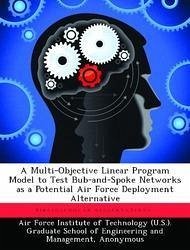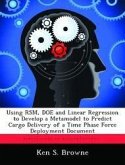The purpose of this research is to develop a multiple-objective mixed-integer linear programming model that determines the feasibility of a new deployment paradigm, which offers greater flexibility to home station and deployed location civil engineers (CE) by applying hub-and-spoke networking. The research covers the histories of CE and Air and Space Expeditionary Force (AEF), current CE deployment needs, multiple-objective decision analysis, hub-and-spoke networking, and organizational behavior benefits of the new paradigm. The methodology section provides details on each objective, explains the model, defines weights, and explains the objective function's calculation. Next, an analysis of the model's resulting scenarios helps determine the appropriate parameters. Research conclusions and recommendations for potential future study are provided. Some of the new paradigm's benefits include the consolidation of coordination, training, equipment, travel, and other mobility related activities. The paradigm provides home station and deployed CE leaders with greater control over the mobilization of their resources. This control should help to reduce fluctuations in home station manpower levels, and deployment to the same location should make the process easier for everyone involved. A final added benefit to regional clustering is that it opens the door to improved networking between active duty and guard/reserve components.








